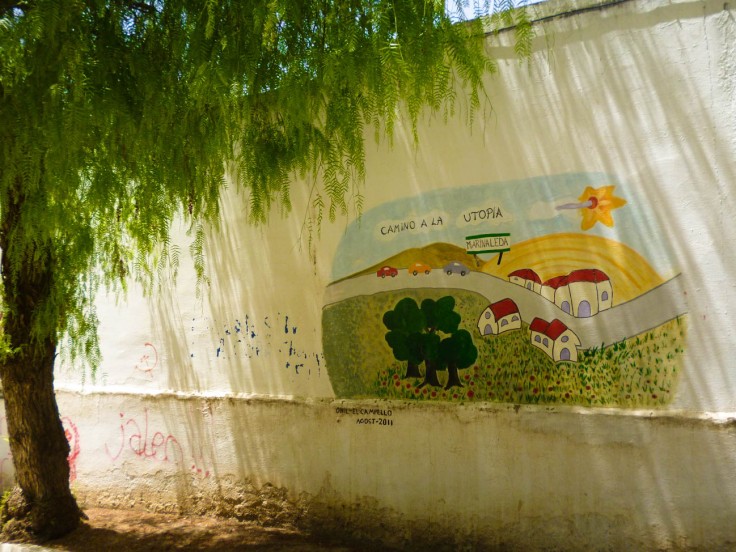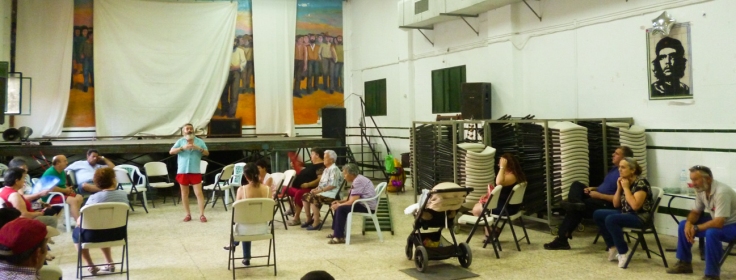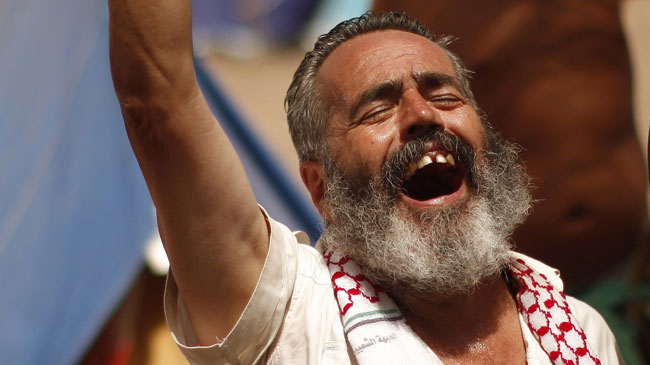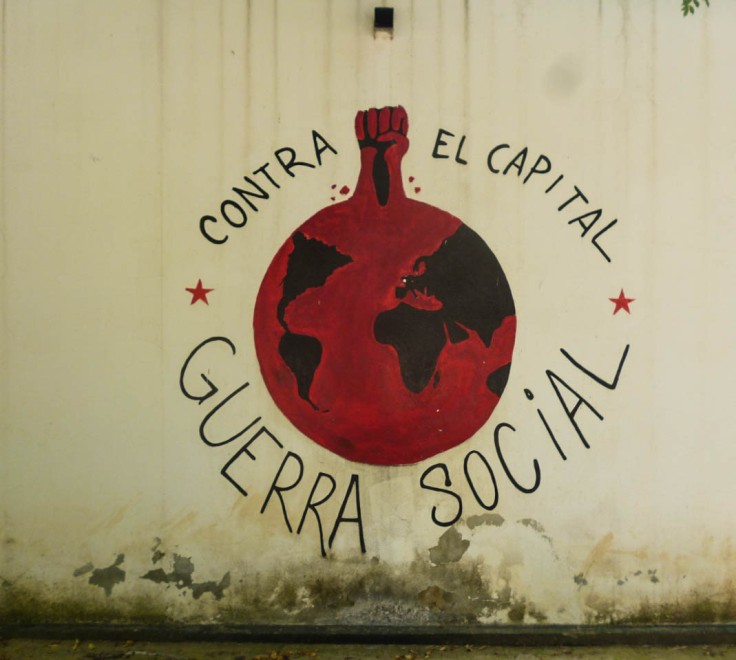‘Marinaleda!?’ we call out to the few cars rolling down the country road to an Andalusian utopia. Most drivers unwillingly decline – headed elsewhere, they indicate; no room in the scoop, a tractor-driver laughs – but soon enough one stops to help out two lost pilgrims. Francisco is his name, and he tells us that our promised land, though beautiful, has both its disciples and its dissidents; those who would call its mayor, Juan Manuel Sánchez Gordillo, a prophet, and those who would call him a despot.
Driving into the town Francisco points out its main landmarks: the Casa del Pueblo (House of the People) Union Hall where unionists come to educate, agitate and organise; the municipal pool where everyone comes to cool off from the soldering heat of the Andalusian interior; the schools, sportsgrounds, and gardens along the way to the council chambers. Marinaleda might appear like any other country town were it not for the countless murals that splash across the walls of these buildings: Che Guevara’s dark eyes gaze out from the sports complex, his famous sign-off Hasta la Victoria Siempre – Until the Victory, Always!’ can be found on a nearby wall. The flags of a red Andalusia, an independent Catalonia and Basque Country, a free Palestine paint the town red, green and blue. Doves fly above words of peace, rebellion and hope; paz, oxi, utopía.

The culprit behind these public displays of imagination? Juan Manuel Sánchez Gordillo, mayor of Marinaleda since 1979, since the return of democracy following Franco’s death. Intellectual, revolutionary, father, Gordillo’s pivotal role in building Marinaleda into a communistic ‘Utopia Towards Peace’, as its town motto declares, has earned him fame and infamy in equal portions. Gordillo’s supporters (who must compose the vast majority of this little town if his election victories say anything) celebrate his leadership in the countless campaigns which have turned Marinaleda into an oasis of full employment in a country where unemployment still soars above twenty percent, where some regions and cities struggle to push it below thirty percent.
The most important fight of them all has been a twelve-year struggle to seize land from a modern-day aristocracy and devolve ownership to the people who work the land, the jornaleros; a struggle which involved a seven hundred person hunger strike which lasted for nearly half a month, countless occupations of countless private parcels of land, and countless legal disputes and negotiations which, ultimately, won them legal ownership of a vast tract of land called El Humoso, a farm now run as a cooperative by the workers themselves. But having secured this long-sought victory at El Humoso, Marinaleda didn’t demobilise the marching file; through the long years of crisis Gordillo led the fight against austerity, at one point walking into a supermarket, filling trollies with food, walking out without paying, and sharing the goods amongst the most in-need families of Marinaleda. This supermarket seizure earned him national and international fame, with the national newspaper El País and the international Guardian declaring him a modern-day Robin Hood, literally stealing from the rich and giving to the poor, or, in his own words (taken from Marx) “expropriating the expropriators”.

Gordillo the Organiser
Waiting to meet Gordillo on Marinaleda’s main street, my friend and I spot him easily: his bushranger’s beard and wild eyes make him instantly recognisable. In a pair of red rugby shorts and matching mallorquina sandals he greets us and takes us to the council chambers just up the road, the engine room of this town’s revolution. Entering his office, the flag of the Spanish Second Republic – which forever became a symbol of the left after a military rebellion toppled the democratic government in 1936 – shines its tricolour of red, yellow and purple from the corner, while a photograph of Che Guevara addressing the United Nations hangs beside it. The centrepiece of the war-room sits on a central round-table: a clay sculpture of a giant’s fists, clenched in a struggle to break free of the iron chains shackled around its wrists. Underneath is engraved ‘MARINALEDA’.

After taking our seats around the clenched fists, Gordillo invites us with open palms to get straight to the point of our visit: a discussion on political philosophy and practise; the man has little time for chit-chat and little taste for social formalities. Godrillo’s political outlook came to maturation just as Spain’s fascist regime came to its end: upon the death of Franco, Gordillo became involved in the Rural Workers’ Union, a rural trade union which allied with the Unitary Candidacy of Workers to present Gordillo as mayoral candidate in Spain’s first municipal elections in 1979 since the collapse of the Francoist regime. Having secured the mayor’s office Gordillo launched campaign after campaign aiming at addressing people’s basic needs: food, water, shelter, electricity. The boldest step in those early years came with the history-making hunger strike, a strike which led only to bolder and bolder actions by the landless farmers, and then the occupations began. Because, as Gordillo told us, “we understood that the fight against unemployment meant a fight for land”; his mayorship thus became, by Marx’s definition, radical; radical in that it grasped things by the root.
But Gordillo’s political path has led him far beyond Marinaleda’s town limits. In 2008 he was elected to the Andalusian Parliament as a member of the United Left coalition, and with this new spotlight to shine he staged what would become an iconic moment in Spain’s economic crisis – the supermarket heist – forever making his name synonymous with the indignados movement against austerity. Although he managed to avoid the law by virtue of parliamentary privilege and not being directly involved in the looting, Gordillo had less luck later on when a court sentenced him to seven months prison for leading a five hundred person occupation of a parcel of military land in Seville province. Normally, a person sentenced to under two years prison in Spain does not actually have to ‘do the time’, but owing to previous offences to do with organising the General Strike of 2012, he could not use this get-out-of-jail-free card. Being the tireless man he is, during his time in jail he wrote a book of poems, entitled ‘The Prisons and Other Poems’. When in 2014 Gordillo was forced to resign from the Andalusian parliament owing to his already occupying a mayoral post, his name had already been cemented in the national psyche as an eternal luchador, a fighter.
Gordillo the Educator
His thinking is, above all, Marxist. He understands the inevitability of class conflict, the necessity of struggle, the obstacles of structural and cultural power. He emphasises political education, or class consciousness, as the most fundamental starting point of collective action, saying: “the expropriated must organise themselves, and realise that they are indeed expropriated… Even the middle classes, they too are expropriated” – expropriated of land, capital, needs, power. And in Marinaleda consciousness raising is of high priority: the murals that paint the walls of this town testify to an amazing effort to inspire, the local community radio station reflects their effort to inform, and there is even a local amphitheatre to cultivate culture. Returning to the question of expropriation, Gordillo posits the question: if we are constantly told of the sacrosanct right of private property, why is it that so few may exercise this right? Who protects the right to property of the countless families facing eviction in Spain, the millions of homeless?

But Gordillo is no dogmatist. He draws inspiration from all sources, from any human being who has dreamt of “building a different world in which the resources are put at the service of the people and not private interests” – that is, people like Ghandi, Che Guevarra, Jesus Christ, together with peoples who are struggling to be recognised as such; the Kurds, the Sahrawis, the Palestinians. As he told us, “you have to take a bit from everyone; you have to take a bit from anarchism, from socialism, from Marxism, from Che, from Lenin (some things), things from everyone, and above all things from your own experience.” Asking him what he has learnt from his own experience, he replies: “that non-violence can achieve anything in the world – that anything is possible.”
Inquiring into his citation of Christ amongst his heroes, he tells us he sees Christ as the first communist. Maybe communist is a stretch, if by communist you mean an ‘all power to the soviet’ communist, but if by communist you mean one of the commune, the collective, the people, then perhaps. “Christ” he believes, “was a revolutionary, and that’s why they got rid of him”. Christ the pacifist, Christ the agitator who declared that “it is easier for a camel to go through the eye of a needle, than for a rich man to enter into the kingdom of God”, Christ the reformer who declared that the kingdom of God is within man, not anywhere else, and certainly not within a Pope (who, Gordillo muses, could live in a flat in Rome rather than the Vatican). It is this social Christian tradition, the same one that the Liberation Theologists picked up upon in Latin America, that Gordillo is happy with, though reports of him interrupting local Holy Week traditions with concerts and other mischief shows he remains hostile to a Church which was once a key ally in, literally, killing of the left in this country. But Gordillo insists that “Christianity and Marxism, Christianity and Communism, are perfectly compatible”, and he recognises a role for a deeper element in political humanism, an element which the various leftist projects of the twentieth century forgot in their turns towards either evil totalitarianism or soulless statism: that is, the spiritual, the existential, the personal. Call it what you may, but his point is that you have to change not only the structures of society but the people, the individuals, lest they fall into corruption, avarice, egoism, and lest leaders live, look and think not like their own people but as the same despots which came before them.

Gordillo the Agitator
During out talk Gordillo is in his zone: confident, articulate, relaxed. Following this introduction to Gordillo the educator, we meet Gordillo the agitator and Gordillo the organiser; the two roles which take the higher toll on the activist. In the local union meeting that night, Gordillo first tries to front a calm face; he talks of the national election campaign and the dilemmas facing the left. But soon the crowd of twenty-odd grows restless, and a trio of three wise men emerge to each capture one part of what seems to be a growing frustration within the ranks of Marinaleda’s true-believers. The first wise man breaks ranks from the patiently listening quorum and declares: “We’re fed up! We don’t care about Podemos or Izquierda Unida, we wanna know what’s happening in Marinaleda! And here’s your chance, mate!” The second agrees, saying “when we started all this we didn’t care about any party or any one!” The discussion accelerates, interjections from all corners of the hall fly, rough rural accents make it hard to keep up – one of the wise men asks “what Marinaleda is this? Is this what we fought for?” and another laments “the union is dead, hombre, without you it’ll all collapse”. The third wise man, a young one, jumps into the fray, complaining about the progress of a local housing project. Gordillo’s skills are being tested, his body language increasingly strained, his patient voice becoming desperate, his hands fighting to communicate what his words can’t. At one point the man begins to swing his entire upper body up and down, flailing his arms in sync with the movements of his torso in some desperate plea for understanding – in this movement the physical and psychological costs of power are symbolised: the long march is an endless march, and maintaining the morale of the marching file sucks away the energy of the flag-bearer up front. Gordillo has been marching for forty years to the promised land; naturally, he is tired, very tired.

Marinaleda and the Cooperativist Solution
But in Marinaleda it is true that they have built a New Jeruselum; a town of full-employment where every worker earns a minimum wage of one thousand euros a month, a decent figure in a land of massive unemployment and wage depression. But Marinaleda, you might say, is Marinaleda: a town of two thousand people and an agricultural-based economy cannot be compared to the cities of Andalusia where unemployment soars to thirty percent and above – Jerez de la Frontera, Cádiz, Sanlúcar de la Barrameda – and certainly, some would argue, Marinaleda cannot be a transferable model. But why not? Why exactly can the cooperative model not be expanded to larger firms, cities, regions, industries, economies?

The fact is there is no good reason why cooperativism shouldn’t flourish is any other context. To the contrary, cooperativism makes financial sense. Instead of channelling profits into third parties – owners and shareholders – which add little or nothing to productive expansion, a cooperative reinvests into the firm’s capital, allowing it to boom in good times and get by in hard times. Conflict between management and labour is minimised or non-existent thanks to democratic representation and decision making, and if the worker-owners do decide that wages must be depressed or even that labour must be shed, then that will be a sacrifice which comes only after profits and production are redirected in a manner which might avoid such downsizing and one which only ever comes with parallel cuts to and caps on executive remuneration. And should a worker lose his or her job, the firm may search for another position in an area which is not in decline. Coops, then, can and do compete.
With such economic and ethical advantages in mind, what is difficult to understand is why the labour movement had largely abandoned the task of cooperativising industries and economies in most parts of the world in the twentieth century. There are notable exceptions, and Spain itself is home to the world’s largest cooperative enterprise – the Mondragon cooperative centred in the Basque Country which now employs some 83,800 workers across the $US20 billion conglomerate – but what must be done now is to revive the cooperative movement not only in the industrial labour movement, but the political labour movement. It does not seem wishful thinking that centre-left governments could formulate national policies on the cooperativisation of the economy through a host of taxation and credit incentives together with legal requirements on companies to provide for cooperative financing for workers should the firm decide to offshore its operations. With such a policy environment, cooperatives – whether from the ashes of abandoned industry, from the goodwill of executives, from scratch, or even through pre-emptory ‘expropriation of the expropriators’ à la Gordillo – would flourish in places as far removed from Marinaleda as could possibly be imagined.
Because what is clear is that cooperatives are good for production and investment, and good for employment and welfare. It is also clear that, after the failures of state-led socialism and the decline of social democracies, coops are a unique mechanism with which our economies may peacefully and democratically convert into post-capitalist societies. Marinaleda has done it, Mondragon has done it, even Australian poultry farmers have taken the lead in giving wings to the cooperativist movement at home; now what’s needed to ignite a wider and deeper cooperativist turn is only the leadership shown by the likes of Juan Manuel Sánchez Gordillo and the commitment shown by the people of Marinaleda. Another world is possible, as Gordillo told my friend and I, you only have to fight for it and it will be ours.
Thoughts?
If you liked this article, leave me your thoughts in the comments section at the bottom of this page. Do you think the Marinaledan model can be transplanted elsewhere? Do you known of any cooperative project near you? Let me know!


Great Article !!!
Looking foward to know this village!!
could you share more places/villages/communities like that??
LikeLike